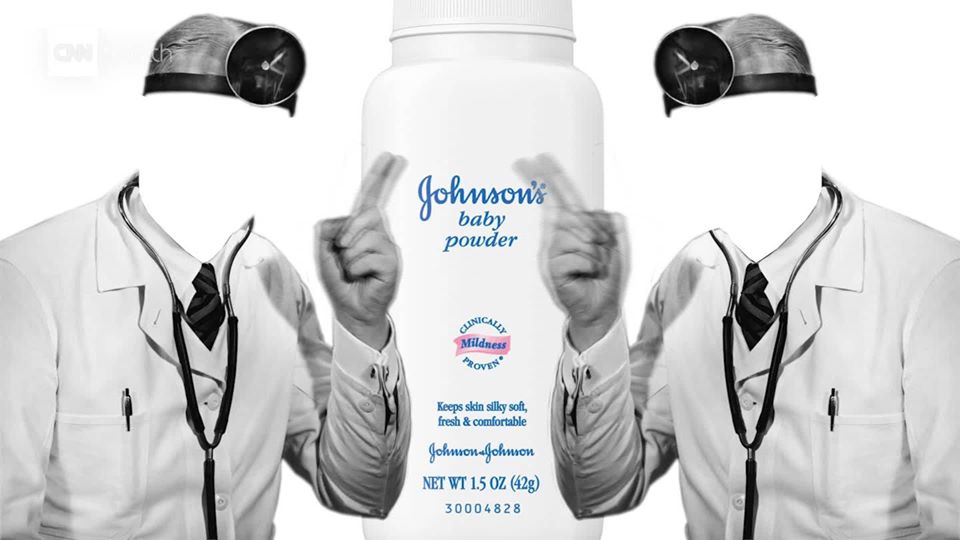[Healthcare\Cancer\Johnson & Johnson]
Rep. Ayanna Pressley & Rep. Jan Schakowsky: “We emphatically urge you to voluntarily warn consumers about the inhalation hazard and risk of cancer posed by your talc-based products…We also urge you to halt all deceptive marketing practices specifically targeting women and young girls of color.”
Photo: Facebook
Johnson & Johnson is accused of concealing alleged asbestos contamination in their baby powder–while specifically marketing their products to Black and Latino women.
This week, Congresswoman Ayanna Pressley (MA-07), Congresswoman Jan Schakowsky (IL-9), sent a letter to Johnson & Johnson Chairman and CEO Alex Gorsky seeking information on the targeted marketing and sale of the company’s talc-based baby powder and its potential to cause harm, particularly to women, teenage girls, and people of color, due to asbestos contamination.
Johnson & Johnson has refused all invitations to testify before Congress, including Tuesday’s House Oversight Committee hearing examining carcinogens in talc.
“Due to your failure to testify before Congress, you have significantly hindered our oversight of your company,” wrote the Congresswomen in their letter. “Despite that, it is our constitutional responsibility to ensure that consumers are accessing safe and healthy products, especially cosmetics and personal care products that are used daily.”
In 1987, talc-based cosmetic products containing asbestos were classified as carcinogenic to humans by the International Agency for Research on Cancer (IARC), a branch of the World Health Organization. In 2006, IARC confirmed perineal use of talc to be “possibly carcinogenic,” prompting a large-scale talc-supplier to include that warning in shipments to all customers, including Johnson & Johnson. However, Johnson & Johnson never passed the warning on to consumers, and instead embarked on a “multicultural marketing” campaign for their baby powder, targeting Black and Latina women.
“It is imperative that personal care products receive additional scrutiny in order to better ensure their safety. Toward that end, the Safe Cosmetics and Personal Care Products Act of 2019 (H.R. 4296), introduced on September 12, 2019, establishes a robust regulatory framework to ensure the safety of cosmetics and personal care products,” wrote the Congresswomen in their letter. “However, this bill and other proposed federal cosmetic safety legislation is currently under consideration by Congress.”
In October 18, 2019, bowing to increasing public pressure, Johnson & Johnson announced their first-ever voluntary recall of 33,000 bottles of baby powder based on the the Food and Drug Administration (FDA)’s findings of asbestos contamination. However, on December 3, 2019, the company issued a press release touting new, privately-conducted safety tests that supposedly refute FDA’s findings, indicating that they plan to halt the recall.
There is currently no law that allows FDA to engage in a mandatory recall of dangerous or life-threatening cosmetics and personal care products.
“…until FDA is given more statutory authority to conduct cosmetic ingredient safety review and mandatory recall, we emphatically urge you to voluntarily warn consumers about the inhalation hazard and risk of cancer posed by your talc-based products. These warnings must be explicit and readily available on product labels so that consumers can make informed decisions about the products they put on their bodies,” wrote the Congresswomen in their letter. “We also urge you to halt all deceptive marketing practices specifically targeting women and young girls of color.”
The lawmakers requested information and documentation regarding Johnson & Johnson’s targeted marketing practices and scientific testing methods for their talc-based products by no later than December 20, 2019.
The full text of the letter is below.
Dear Mr. Gorsky,
We are writing to express our deep concerns regarding the ingredients contained in some of your personal care products and their potential to cause harm, particularly to women, teenage girls, and people of color. Due to your failure to testify before Congress, you have significantly hindered our oversight of your company. Despite that, it is our constitutional responsibility to ensure that consumers are accessing safe and healthy products, especially cosmetics and personal care products that are used daily.
Currently, the average woman uses approximately twelve personal care products each day, resulting in exposure to one-hundred and sixty-eight unique chemical ingredients. These exposures have been linked to cancer, infertility, miscarriage, poor infant and maternal health outcomes, obesity, asthma, and many other serious health concerns. Women of color, who use a higher number of products daily, are disproportionately exposed to harmful chemicals through personal care products. A 2018 study released by the Breast Cancer Prevention Partners found that the most toxic product it tested was a children’s shampoo from a hair-relaxing kit marketed to young Black girls, containing carcinogens, hormone disruptors, and other toxins.
More specifically, we have concerns about the health impacts of talc, as well as the fact that many talc products are contaminated with asbestos, a known carcinogen. As far back as 1987, talc-based cosmetic products containing asbestos have been classified as carcinogenic to humans by the International Agency for Research on Cancer (IARC), a branch of the World Health Organization. Subsequently, in 2006, IARC specifically confirmed perineal use of talc to be “possibly carcinogenic,” prompting talc-supplier Luzenac America Inc. to include that warning in its shipments to all customers, including Johnson & Johnson. However, the warning was never passed on to consumers through your company’s product labels. Furthermore, the United States Food and Drug Administration (FDA) has repeatedly found cosmetics and personal care products marketed towards women and children were contaminated with asbestos—the most recent agency warning to consumers was released in October about a contaminated lot of your baby powder.
As a result of the scientific evidence identifying asbestos-contamination in talc-based products and linking such contamination to increased cancer incidence, thousands of consumers have filed lawsuits against the manufacturers of personal care products containing talc. Juries around the country and several scientific studies have also found that exposure to baby powder causes increased risk of ovarian cancer and mesothelioma. More alarmingly, there have been repeated reports that you knew of the asbestos contamination for decades, yet continued to market and sell your talc-based products. Internal memorandums also show that after your company learned of asbestos contamination, marketing of talc-based products was specifically directed at Black and Latina women.
In light of this troubling evidence, we ask you to provide the following documentation and answer the following questions no later than December 20, 2019:
(1) Documents that your company filed in federal court revealed that in response to stagnating sales of baby power, in 2008—two years after learning your talc-based products were possibly carcinogenic—Johnson & Johnson began a new marketing strategy aimed at Black and Latina consumers that involved direct ad buys and giveaways. One example of this strategy included 100,000 gift bags containing talc-based baby powder and other Johnson’s baby products that were distributed in Black and Latino neighborhoods in Chicago. In response to recent media reports around these practices, your company has said “we’re proud pioneers of the practice of multicultural marketing.”
*Please provide internal documents detailing your company’s “multicultural marketing” strategy, including information on money spent, geographic communities targeted, and all advertising materials utilized.
(2) While engaged in your targeted marketing campaign, you concluded the “right place” to focus were areas with a “higher [African American] population” and that “powder is still considered a relevant product among [African American] consumers. This could be an opportunity.” You focused on “ethnic (African American/Hispanic) opportunities to grow the franchise.” To expand sales among Black and Latina women, your company distributed samples in Black and Latino neighborhoods, ran print and digital campaigns, enlisted paid radio advertisements to reach “curvy Southern women 18-49, skewing African American,” and enlisted third parties, including Weight Watchers.
*Please provide any materials related to this marketing campaign or any similar marketing campaign conducted by your company, including:
All marketing plans targeting Black and/or Latina women;
Contracts, cooperative agreements, or other documents by which your company engaged the services of third parties to promote talc-containing products to Black and/or Latina women, including Weight Watchers;
Print, radio, television, or digital advertisements that feature Black and/or Latina women and promote the sale of talc-containing products; and
Any other marketing materials which promote the sale of talc-containing products to Black and/or Latina women.
(3) Your company continues to contend that your products produced with talc are asbestos free. However, based on evidence and testimony received during the March 12, 2019 House Committee on Oversight and Reform’s Subcommittee on Economic and Consumer Policy hearing entitled, “Examining the Public Health Risks of Carcinogens in Consumer Products,” we are deeply troubled by this claim.
*When you claim your products are asbestos free does this mean your baby powder contains absolutely no asbestos whatsoever; your testing of talcum powder does not show the presence of asbestos; your talcum powder may contain up to one percent asbestos; or something else entirely?
*Please describe your protocol for testing talc for potential asbestos contamination and when these processes were put in place; specifically, the steps you have taken in the past and now take in order to guarantee that no asbestos, in any quantity, will ever be found in your talc-containing products. Please also provide written documentation demonstrating that these steps are indeed effective and support your claim.
*Please include how frequently you test the talc you use to ensure it is not contaminated by asbestos at dangerous levels; what the quantities of talc that you test are; and whether you test mined talc, processed talc, or the finished product itself for asbestos contamination.
*Please provide all test results from 2006 to present day, including information regarding what type of testing is done to certify your talc is not contaminated by asbestos. If you have destroyed these test results or refuse to provide any results, please provide your rationale for doing so.
It is imperative that cosmetics and personal care products receive additional scrutiny in order to better ensure their safety. Toward that end, the Safe Cosmetics and Personal Care Products Act of 2019 (H.R. 4296), introduced on September 12, 2019, establishes a robust regulatory framework to ensure the safety of cosmetics and personal care products. This framework demands accountability and includes a strong safety standard for cosmetic ingredients that is protective of all consumers, and in particular, vulnerable subpopulations like women of color and professional salon workers. This bill was considered during the December 4, 2019 House Committee on Energy and Commerce Subcommittee on Health legislative hearing entitled, “Building Consumer Confidence by Empowering FDA to Improve Cosmetic Safety.”
However, this bill and other proposed federal cosmetic safety legislation is currently under consideration by Congress. While we are encouraged that you recalled 33,000 bottles of your baby powder for the first time ever in October after FDA detected asbestos contamination, your recent press release about new safety tests that supposedly refute FDA’s findings suggests that you intend to put these products back on the market. We urge you not to do so. Furthermore, until FDA is given more statutory authority to conduct cosmetic ingredient safety review and mandatory recall, we emphatically urge you to voluntarily warn consumers about the inhalation hazard and risk of cancer posed by your talc-based products. These warnings must be explicit and readily available on product labels so that consumers can make informed decisions about the products they put on their bodies. We also urge you to immediately halt all deceptive marketing practices specifically targeting women and young girls of color. All American women deserve personal care products that are safe.
Thank you in advance for your attention to this matter.








